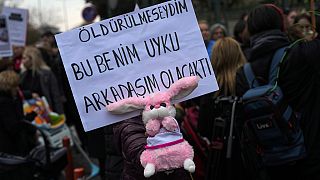Turkey
Rescue workers in the Turkish port city of Izmir are continuing to search for the survivors of Friday's deadly earthquake, as officials said the death toll has increased to at least 64.
The powerful 6.6-magnitude earthquake has claimed at least 62 lives in Turkey and two teenagers died on the Greek island of Samos.
Nearly 900 people were injured, two-thirds of them have now been discharged from the hospital.
The quake triggered tidal waves that hit the Turkish and Greek islands.
Over a dozen buildings in Izmir were severely damaged or destroyed by the initial quakes and the hundreds of aftershocks that ensued. Parts of the city were also flooded by seawater.
'Never lose hope'
Rescue teams are scouring through the rubble of collapsed buildings for a third day looking for survivors.
Shortly after midnight, Ahmet Citim, 70, was pulled from the rubble of a building in Izmir. Health Minister Fahrettin Koca said in a Tweet: "I never lost my hope."
It is unclear how many people remain trapped under the rubble. Turkish media reported three more people were pulled out Sunday from one collapsed apartment building but their conditions were not known.
Turkey is prone to earthquakes. In 1999, two powerful quakes killed some 18,000 people in northwestern Turkey. Earthquakes are frequent in Greece as well.
In a rare show of unity amid months of tense bilateral relations, Greek and Turkish government officials issued mutual messages of solidarity over the quake toll.
The quake occurred as Turkey was already struggling with an economic downturn and the coronavirus pandemic.
More than 10,000 people in Turkey have died from COVID-19.












01:42
Fourth mass coral bleaching prompts UN alarm
01:55
Uganda invests $3 billion in new railway system for efficient transport
01:10
Putin concludes BRICS summit with call for UN reform
Go to video
Over 3 million without power as Hurricane Milton slams Florida, causes deaths and flooding
01:08
Ship carrying hundreds of foreign nationals fleeing Lebanon arrives in Turkey
Go to video
Greek authorities detain migrants on the southern island of Crete as smugglers seek new routes